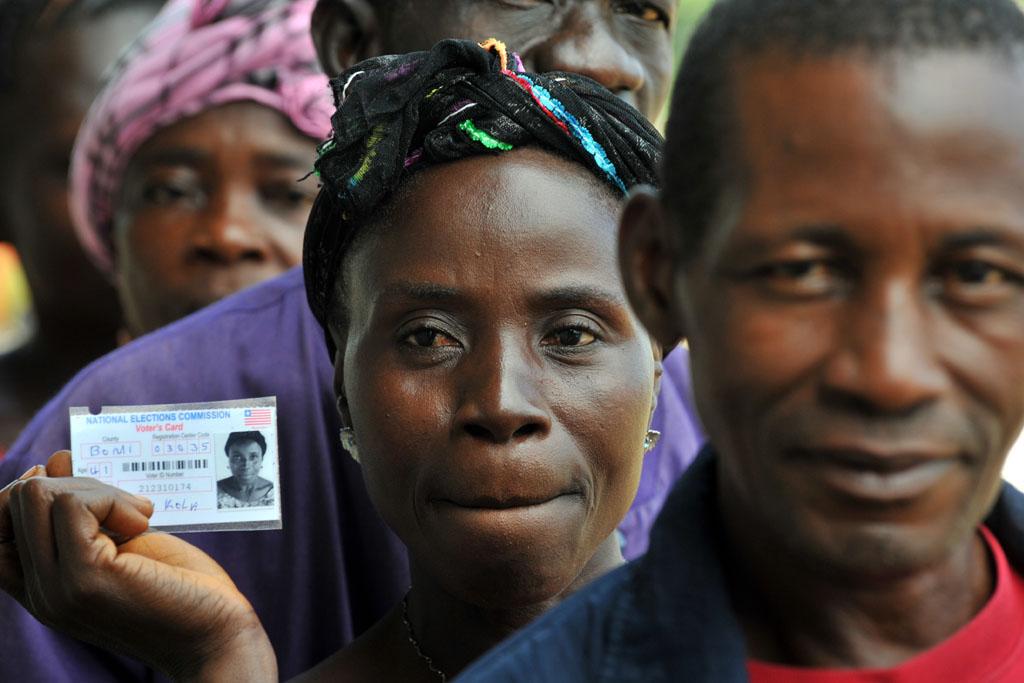Run-off election in Liberia subdued day after deadly skirmish
A woman holds her voter’s card as she waits in line to cast her ballot at a polling station in the village of Fefeh Town on Nov. 8, 2011.
MONROVIA, Liberia — Low voter-turnout in this small West African nation has marred Tuesday’s runoff election, one day after a bloody confrontation between security forces and opposition supporters.
This is only the second election since Liberia emerged from two decades of civil war, making the presidential vote an important referendum on the nation’s future.
President Ellen Johnson Sirleaf was to face off against opponent Winston Tubman Tuesday after the two received the top-most votes in the Oct. 11 election. But Tubman withdrew from the race late last week, charging fraud.
The U.S. State Department said Monday it was "disappointed" in Tubman's withdrawal, and that his allegations of fraud were "unsubstantiated." The Carter Center and other international observers have described the first round of voting on Oct. 11 as free and fair.
Hundreds of supporters of Tubman's Congress for a Democratic Change gathered at party headquarters midday Monday to stage what party officials said was a peace march to protest the holding of the runoff elections.
More: Liberia lines up for round two
Tubman said that there were widespread irregularities that had not been addressed by Liberia's independent elections commission. He also vowed not to recognize any government formed from Tuesday's vote.
On Monday, opposition demonstrators threw rocks at Liberian national police, who fired back with tear gas and live ammunition. At least two demonstrators were killed, and many more injured. Police beat protesters with batons and made dozens of arrests as the crowds ran for their lives amid sounds of gunshots.
As the police dragged her away, an opposition supporter, blood dripping down her face, shouted: “We are ready to die for our right!”
President Johnson Sirleaf urged Liberians in a nationwide address on Saturday "not to succumb to fear and intimidation," and encouraged people to exercise their right to vote.
More: Liberia election riots turn deadly
Still, the skirmish seemed to keep people from the polls. Many of the country's polling stations had seen only a trickle of voters hours after opening. Opposition supporter Alfred Paye was among a crowd gathered outside a polling center in Monrovia.
"My party is out,” Paye said. “Yesterday our right was being violated. I think the police would have used a different means of dispersing the crowd, but not live bullets. So for this reason I won't go to vote.”
Zeon Festus Zeon spoke to reporters from the back of a police pick-up.
“I tried to make peace, the officer knows even the UN troops knows that I came to make peace. They tore my clothes and they are carrying me to the police station. I feel harassed in my own country,” Zeon said.
Soccer legend George Weah, the opposition vice-presidential candidate, on Monday condemned the police action against citizens. He said had merely wanted to express their anger over the outcome of the first-round vote. “They have killed our people.”
The clash came a day after Tubman said that the post-war nation could slip into chaos not seen since the civil war if the election taking place today was not delayed and reorganized.
"The disruption, the anger would take us back to the dark days," Tubman said.
Wade Williams is an editor at FrontPage Africa, Liberia's most widely circulated newspaper, and a fellow of New Narratives, a mentorship program for independent media in Africa.
